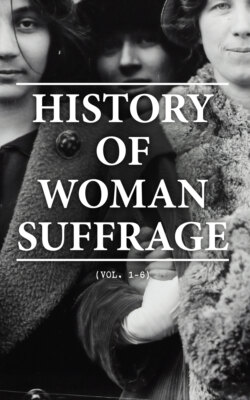Читать книгу History of Woman Suffrage (Vol. 1-6) - Various - Страница 37
На сайте Литреса книга снята с продажи.
MISTRESS ANNE HUTCHINSON.
ОглавлениеMistress Anne Hutchinson, founder of the Antinomian party of New England, was a woman who exerted great influence upon the religious and political free thought of those colonies. She was the daughter of an English clergyman, and with her husband, followed Pastor Cotton, to whom she was much attached, to this country in 1634, and was admitted a member of the Boston church, becoming a resident of Massachusetts one hundred and forty years before the Revolutionary war. She was of commanding intellect, and exerted a powerful influence upon the infant colony.
It was a long established custom for the brethren of the Boston church to hold, through the week, frequent public meetings for religious exercises. Women were prohibited from taking part in these meetings, which chafed the free spirit of Mistress Hutchinson, and soon she called meetings of the sisters, where she repeated the sermons of the Lord's day, making comments upon them. Her illustrations of Scripture were so new and striking that the meetings were rendered more interesting to the women than any they had attended. At first the clergy approved, but as the men attracted by the fame of her discourses, crowded into her meetings, they began to perceive danger to their authority; the church was passing out of their control. Her doctrines, too, were alarming. She taught the indwelling of the Holy Spirit in each believer, its inward revelations, and that the conscious judgment of the mind should be the paramount authority. She was the first woman in America to demand the right of individual judgment upon religious questions. Her influence was very great, yet she was not destined to escape the charge of heresy.
The first Synod in America was called upon her account. It convened August 30, 1637, sat three weeks, and proclaimed eighty-two errors extant; among them the tenets taught by Mistress Hutchinson. She was called before the church and ordered to retract upon twenty-nine points. The infant colony was shaken by this discussion, which took on a political aspect.30 Mistress Hutchinson remained steadfast, and was sustained by many important people, among whom was the young Governor Vane.
Church and State became united in their opposition to Mistress Anne Hutchinson. The fact that she presumed to teach men, was prominently brought up, and in November, 1637, she was arbitrarily tried before the Massachusetts General Court upon a joint charge of sedition and heresy. She was examined for two days by the Governor and prominent members of the clergy. The Boston Church, which knew her worth, sustained her, with the exception of five members, one of them the associate pastor, Wilson. But the country churches and clergy were against her, and she was convicted and sentenced to imprisonment and banishment.
As the winter was very severe, she was allowed to remain in Roxbury until spring, when she joined Roger Williams in Rhode Island, where she helped form a body-politic, democratic in principle, in which no one was "accounted delinquent for doctrine." Mistress Hutchinson thus helped to dissever Church and State, and to found religious freedom in the United States.
After her residence in Rhode Island, four men were sent to reclaim her, but she would not return. Upon the death of her husband she moved, for greater security, to "The Dutch Colony," and died somewhere in the State of New York.
Thus, through the protracted struggle of the American Colonies for religious and political freedom, woman bravely shared the dangers and persecutions of those eventful years. As spy in the enemy's camp; messenger on the battle-field; soldier in disguise; defender of herself and children in the solitude of those primeval forests; imprisoned for heresy; burned, hung, drowned as a witch: what suffering and anxiety has she not endured! what lofty heroism has she not exemplified!
And when the crusade against slavery in our republic was inaugurated in 1830, another Spartan band of women stood ready for the battle, and the storm of that fierce conflict, surpassing in courage, moral heroism, and conscientious devotion to great principles, all that woman in any age had done or dared. With reverent lips we mention the names of Sarah and Angelina Grimke, Lydia Maria Child, Maria Weston Chapman, Mary S. Parker, Abby Kelly, whose burning words of rebuke aroused a sleeping nation to a new-born love of liberty. To their brave deeds, pure lives, and glowing eloquence, we pay our tributes of esteem and admiration.
To such as these let South Carolina and Massachusetts build future monuments, not in Quincy granite, or Parian marble, but in more enduring blessing to the people; inviolable homesteads for the laborer; free schools and colleges for boys and girls, both black and white; justice and mercy in the alms-house, jail, prison, and the marts of trade, thus securing equal rights to all.
